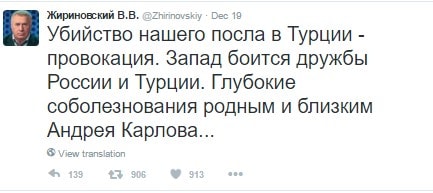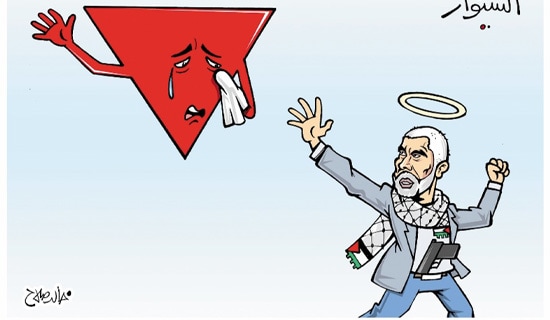In a televised speech on December 19, Turkish president Recep Tayyip Erdogan called the assassination of Russia's ambassador to Turkey Andrey Karlov an "open provocation" to Turkey-Russia relations. Erdogan stated: "We know that this is a provocation especially to hamper the normalization process between Turkey and Russia, but both the Russian government and the Turkish government have the will to resist this provocation." He then added: "As we have agreed with [Russian President Vladimir] Putin, we will launch a joint investigation commission."[1]
The Russian Foreign Ministry stated its expectation that the Turkish authorities would cooperate with the Russian agencies in investigating the circumstances of "this barbaric crime," in order to identify and apprehend its organizers and to take effective measures to protect the safety of Russian citizens.[2]
The Turkish media reported that Karlov's assassin, municipal police officer Mevlut Mert Altintas, upon entering the scene of the crime, an Ankara arts center, was "admonished by security personnel at the entrance to the venue after he refused to proceed through an X-ray device but was subsequently granted entry after he showed his police ID."[3] It was also reported that Altintas guarded the Russian embassy in Ankara earlier in December, when it was targeted by protest rallies against Russia’s involvement in Syria.[4]

(Source: Hurriyetdailynews.com)
Russia-Iran-Turkey Meeting On Syria
On December 20, Moscow hosted talks between the foreign and defense ministers of Russia, Iran and Turkey, focusing on the Syrian conflict.[5] In his opening remarks, Russian Foreign Minister Sergey Lavrov said that the "barbaric crime" reminded everyone once again that "fighting terrorism must be uncompromising and relentless". Lavrov added: "If the organizers of the terrorist act thus wanted to foil the fight against terrorism in general, and our today’s meeting, in particular, they failed to do so, and will always fail. It is an absolutely provocative, perverse and unacceptable logic when people try to justify terrorists and stop the fight against them by using such acts of intimidation." He then stressed: "The attempts by some members of the international community to represent the matter in a way that supporting the legal government of Syria, which is a UN member, in its fight against terrorism only reinforces the terrorist threat, are absolutely unacceptable. Clearly, it is an attempt to let the terrorists off the hook."[6]
Blaming The Turkish Police
Senator Konstantin Kosachev used his Facebook account to criticize the Turkish police particularly given the recent July 15 coup attempt: "Why wasn't the murderer killed immediately following the terror act? He just continued to shout his noxious slogans... for couple of minutes. Where were the police at that moment? Did they run away? Run out to make a phone call for reinforcements? Fell down on the floor? Were they at all present...What are the instructions for securing such events involving diplomatic staff? Or are there no such instructions?"[7]

(Source: Facebook.com/people/Константин-Косачев)
The Russian media outlet Pravda published an op-ed on Russia-Turkey relations after Karlov’s killing. Pravda wrote: "Today, Russia no longer trades the lives of her diplomats, nor does she resort to terror to respond to terror. The Turks are well aware of it. Turkish President Erdogan called his Russian counterpart nearly immediately after the attack on the Russian ambassador in Ankara. Erdogan informed Putin about his personal control over the investigation and promised to strengthen the protection of the Russian diplomatic mission in Turkey. Is it enough?
"Incomplete trust, understatements and outright suspicion remain dominant in the Russian-Turkish relations. The killing of Andrei Karlov in Ankara will only make matters worse. The tragic event in Ankara has also unveiled huge flaws in the security system that ensures protection of Russian diplomats in the warring state, where terrorist attacks occur regularly.
"Whichever goals the killer... may have had, Turkish official circles and the media rushed to declare him a member of the semi-mythical terrorist organization FETO [Fethullah Gulen Terrorist Organisation]. This is what Turkish President Erdogan calls almost all of his internal and external enemies, attributing them all to supporters of his notorious political opponent Fethullah Gulen. However, a court in Istanbul had earlier found that there was no court decision to confirm the existence of an armed terrorist organization called FETO. Yet, the sitting Turkish administration has been conducting a real witch hunt under the guise of the struggle against the semi-mythical organization for three years. Thousands of Erdogan's adversaries still remain in Turkish jails - those people are accused of either plotting the coup in Turkey or simply supporting Gulen.
"All observers unanimously stated that the main purpose of the killing of the Russian diplomat was an attempt to strike an extremely painful and heavy blow to the slow recovery of the Russian-Turkish relations. Of course, the goal has been achieved, and much will now depend on Erdogan. In the first seconds after the fatal shots, the killer clearly shouted that he came to take revenge for Russian actions in Syria. However, the Turkish President, without doubting for a moment, immediately referred to his favorite tale of Fethullah Gulen, who is hiding in the U.S.
"Recep Erdogan has recently announced real reasons of his interference in the Syrian conflict. The Turkish president suddenly announced his intention to remove his personal enemy – [Syrian President] Bashar Assad - from power in Syria. Needless to say that this plan runs contrary to Russia's goals in the country. One shall assume that it will be very hard for Erdogan to retrieve Putin's confidence.
"On December 20, during the trilateral meeting between Russian, Iranian and Turkish ministers of defense and foreign affairs, Sergei Lavrov, the head of the Russian Foreign Affairs Ministry, stated that Russia, Iran and Turkey were most effective forces for the resolution of the crisis in Syria. If the Turks do not find the courage to admit that all traces of terror in the Middle East lead to the Islamic quasi state... but continue to refer to Gulen instead, there will be no further progress made between the two countries.
"On December 19, Turkey put another bloody sacrifice on the altar of terrorism of the Middle East, and Turkey did it at Russia's expense, because Turkey has been playing up to supporters of Mideastern terrorism for many years. Obviously, Russia will continue trying to resolve the conflict in Syria and develop relations with Turkey at the same time. However, the current stance of the Turkish administration to admit errors in both domestic and foreign policy is not likely to bring any results."[8]
Yabloko’s Leader: "The International Security System Has Become Fragile, As It Was On The Threshold Of World War I"
The leader of the Russian opposition party Yabloko, Grigory Yavlinsky, wrote on his Facebook account: "An act of terror took place in Ankara. Andrey Karlov, Russian Ambassador in Turkey, was killed. What happened was not just an accident and not just one more tragedy in a long list of terrorist attacks over the past period. This is a characteristic feature of a qualitatively new situation in the world. The international security system has deteriorated in recent years and has become as fragile as it was on the threshold of World War I.
"Politicians are liable for the development of the international situation, when a high-ranking diplomat may become a victim. What happened has been yet another signal that the priority task and a shared responsibility of politicians should be to find and adopt measures for reduction of the tension, while it is still possible, until it has not gone too far..."
Russian Politicians And Experts Claim That Saudi Arabia Or The West Are Behind The Attack
Elena Suponina, advisor to the director of the think tank Russian Institute of Strategic Studies (RISS) said: "This terror attack has demonstrated that winning the battle for Aleppo is not the end of the story. The terror threat on the contrary will be on the rise since the radical forces feel under pressure. After the attack, I'm sure, Moscow and Ankara will try to cooperate even closer – it's a good thing that Iran has joined in. In a perspective these three countries (Russia, Turkey, Iran) will be able to lower the tension in Syria, though in the near future the rise of terror threats is inevitable."[9]
According to Anna Glazova, deputy director of the RISS, the ambassador was killed, because "some regional countries which back terrorists in Syria were extremely irritated" with the ambassador's success in conducting a dialogue with opposition groups and calming down the situation in Syria. According to Glazova, the result "will have the directly opposite effect" and will provide an impetus for Russia, Turkey, Iran and other regional countries to unite their forces against terrorism "the main threat to international security".[10]
Yevgeny Satanovsky, president of the Institute of the Middle East in Moscow, supports this idea. Satanovsky said: "In my view, this is revenge on Russia for the defeat in Aleppo. Currently the incident still has not been investigated but those who ordered the assassination could only be the Saudis, more specifically a concrete heir to [Saudi Defense Minister] Prince Mohammad bin Salman, for whom the defeat in Aleppo is a catastrophe along the way to the throne." He then added: "It could have been the Qataris... because Qatar has many issues with Russia in Syria and is preparing to continue the war there. But.... on Turkish territory this is very doubtful: Today Turkey is Qatar's principal military partner. This leaves only Saudi Arabia."[11]
Vladimir Zhirinovsky, who leads the right-wing nationalist Liberal Democratic Party of Russia, preferred to shift the blame for the attack to the West. On his Twitter account, Zhirinovsky wrote: "The murder of our ambassador in Turkey is a provocation. The West fears the friendship between Russia and Turkey. My deepest condolences to Andrey Karlov's friends and family."[12]

(Source: Twitter.com/Zhirinovskiy)
Senator Alexei Pushkov took a different approach that discounted broader involvement in the murder: "I think that this is the work of a loner who decided to take revenge on Russia for its actions in Syria or the act of some sort of organization."[13]
[1]Hurriyetdailynews.com, December 20, 2016.
[2] Mid.ru, December 19, 2016
[3]Hurriyetdailynews.com, December 20, 2016.
[4]Sputniknews.com, December 20, 2016.
[5] See: Joint Statement by the Foreign Ministers of the Islamic Republic of Iran, the Russian Federation and the Republic of Turkey on agreed steps to revitalize the political process to end the Syrian conflict, Moscow, 20 December 2016.
[6] Mid.ru, December 20, 2016.
[7]Facebook.com/people/Константин-Косачев, December 20, 2016.
[8]Pravdareport.com, December 20, 2016.
[9] Ria.ru, December 20, 2016.
[10] Riss.ru, December 20, 2016.
[11] Rbth.com, December 20, 2016.
[12]Twitter.com/Zhirinovskiy, December 19, 2016.
[13] Rbth.com, December 20, 2016.








